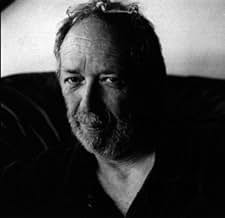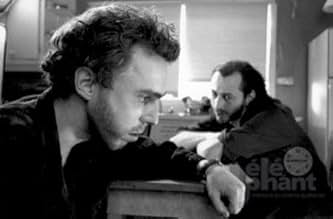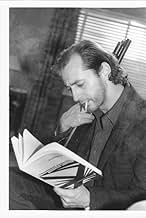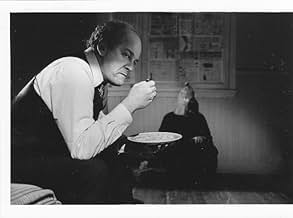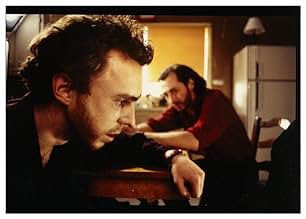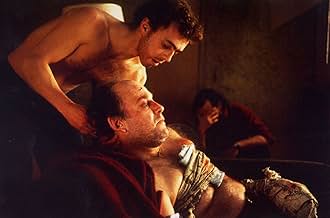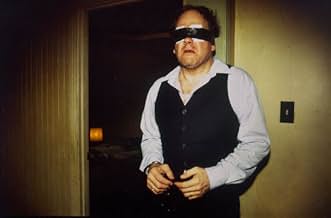A dramatization of the infamous Canadian terrorist abduction & murder of a government minister by a cell of The Quebec Liberation Front.A dramatization of the infamous Canadian terrorist abduction & murder of a government minister by a cell of The Quebec Liberation Front.A dramatization of the infamous Canadian terrorist abduction & murder of a government minister by a cell of The Quebec Liberation Front.
Hugolin Chevrette-Landesque
- Neveu
- (as Hugo C. Landesque)
- Director
- Writers
- All cast & crew
- Production, box office & more at IMDbPro
Featured reviews
Octobre - I have vivid memories of this sad time. I hoped this would be a film with a message for history. I didn't see it.
The idea that characters in this film tried to break out of their role in some human fashion is a mystery to me. The results of real-life October 1970 was not as complex as this film claims: The FLQ kidnapped and murdered a politician. That is not human - it is inhuman.
Another idea in this film is that the terrorists were simply working class people who got fed up with oppression and tried to wake up a nation. Once again the truth I remember in 1970 wasn't that complex. By kidnapping and murdering they became the oppressors they hated. Kafka was right - the rebel who kills the oppressor eventually becomes the oppressor.
Saddest of all for me is the film's implicit message that the FLQ terrorists were somehow faced with a dichotomy: to remain oppressed or to kill their kidnap victim for recognition.
How different is that from Islamic terrorists flying planes into buildings and others who think that they too are oppressed and unrecognized? I hope someone will someday make another film about this sad chapter in Quebec/Canadian history. And I hope that film will portray a vivid lesson that I learned living through that awful time: Murder and violence is an affront to humanity and will never build a civil or livable country! THAT is the only lasting message I remember from the October Crisis.
The idea that characters in this film tried to break out of their role in some human fashion is a mystery to me. The results of real-life October 1970 was not as complex as this film claims: The FLQ kidnapped and murdered a politician. That is not human - it is inhuman.
Another idea in this film is that the terrorists were simply working class people who got fed up with oppression and tried to wake up a nation. Once again the truth I remember in 1970 wasn't that complex. By kidnapping and murdering they became the oppressors they hated. Kafka was right - the rebel who kills the oppressor eventually becomes the oppressor.
Saddest of all for me is the film's implicit message that the FLQ terrorists were somehow faced with a dichotomy: to remain oppressed or to kill their kidnap victim for recognition.
How different is that from Islamic terrorists flying planes into buildings and others who think that they too are oppressed and unrecognized? I hope someone will someday make another film about this sad chapter in Quebec/Canadian history. And I hope that film will portray a vivid lesson that I learned living through that awful time: Murder and violence is an affront to humanity and will never build a civil or livable country! THAT is the only lasting message I remember from the October Crisis.
Again, Falardeau has put his camera where it hurts, where a camera should be ! A lot where fearing a radical, simplistic view of the events of October 1970, but were surprised to witness that the director's take on the FLQ's actions were concentrated mostly on the human aspect. These men were not brainwashed activists or militarily trained supermen, they were Quebec workers, french speaking working class citizens who got fed up with oppression and decided to wake up a nation. But by doing so, one soon realizes that he has to be willing to give up everything for the cause. These guys were not super heroes, they were not mindless protesters; they doubted, they feared, they hoped, they laughed, they cried, they hurt each other, they despaired...they were and are human beings. Real human beings. And that's what interested Falardeau. Ordinary people taking extraordinary measures to shake a system that doesn't want to listen to them. But they found themselves in a dead end once the government decide to send in the army instead of negotiating. If they would have let the hostage go, they're whole operation would have seemed as a farce and the demands of Quebec would once again not be taken seriously. But as they say in the film, they were not murderers. They were faced with a dilemma: go all the way or be forever sheep in a country that does not even recognize the existence of their nation. You can feel all the pressure of that dilemma in "Octobre". And to me, that is the main reason for the film's being. It is not simplistic. It does not evacuate the moral issues of the actions taken by the protagonist. It shows the other side of a revolution, the human difficulties that go with it. And that is no minor task. For once, in Quebec, we were told a story from a non-institutional point of view. And only this, to start with, makes "Octobre" essential viewing.
As a movie, Octobre is not very interesting, except maybe for Quebeckers that might want to renew with a part of their past, in a fictionalized way.
As a documentary, Octobre is totally wrong, showing us just one biased side of the story, failing to describe the reality.
The felquists are well played by the lead actors but the story is not very inspiring. After kidnaping the minister of Labor, Pierre Laporte, they wait for the government to negotiate with them. They want the independence of Québec.
Falardeau, himself in favor of independence from Canada, presents the felquists as heros, good guys that needed to do what they've done, for the «cause». While in fact, these guys are just fanatics that read a little too much books about the Revolution. They had the arrogance to think that they were talking for everybody else, that Quebeckers were a 100% behind them.
So it goes on! They kidnaped the minister but they treat him like a friend. Maybe a little bit more water, monsieur le ministre! We're sorry we have to do that! They even give a good tip to the delivery guy! I think it's a manipulative way for Falardeau to present the felquists as martyrs of the independence. And one of the felquists to say: «If we didn't had heart, we wouldn't be here today»...
As all terrorists, the felquists in this movie had an utopian idea of the country where they wanted to live. They were sure about one thing: they were right. And Falardeau, by making this movie, wants us to have sympathy for those guys. Well, sorry Mr Falardeau, but I think your movie may appeals to some independists from Québec, but no more. Cause, once again, as a movie, it's not that good, and as a documentary, it's just propaganda.
Because of the acting, I gave this movie 73 out of 100. That's good for **½ on a **** stars rating system.
Seen at home in Welland, on January 29th, 2002.
As a documentary, Octobre is totally wrong, showing us just one biased side of the story, failing to describe the reality.
The felquists are well played by the lead actors but the story is not very inspiring. After kidnaping the minister of Labor, Pierre Laporte, they wait for the government to negotiate with them. They want the independence of Québec.
Falardeau, himself in favor of independence from Canada, presents the felquists as heros, good guys that needed to do what they've done, for the «cause». While in fact, these guys are just fanatics that read a little too much books about the Revolution. They had the arrogance to think that they were talking for everybody else, that Quebeckers were a 100% behind them.
So it goes on! They kidnaped the minister but they treat him like a friend. Maybe a little bit more water, monsieur le ministre! We're sorry we have to do that! They even give a good tip to the delivery guy! I think it's a manipulative way for Falardeau to present the felquists as martyrs of the independence. And one of the felquists to say: «If we didn't had heart, we wouldn't be here today»...
As all terrorists, the felquists in this movie had an utopian idea of the country where they wanted to live. They were sure about one thing: they were right. And Falardeau, by making this movie, wants us to have sympathy for those guys. Well, sorry Mr Falardeau, but I think your movie may appeals to some independists from Québec, but no more. Cause, once again, as a movie, it's not that good, and as a documentary, it's just propaganda.
Because of the acting, I gave this movie 73 out of 100. That's good for **½ on a **** stars rating system.
Seen at home in Welland, on January 29th, 2002.
First off this movie as to be taken for what it is worth - A historical reconstruction of what might of happen to the four men who kidnapped Pierre Laporte, Ministère du Travail in the cabinet of Robert Bourassa's provincial liberal government in Quebec.
Once that this is taken into consideration, the movie can really be enjoyed. It really differs from any political statements or supposedly "objective" journalist piece on this unforgivable event. What Pierre Falardeau was going for here was to demonstrate the psychological nightmare that these five men went through during that ordeal. This movie is not a historical reconstruction of the events of the October Crisis, and although Falardeau - a personal friend of Francis Simard, one of the kidnappers- is a well-known supporter of Quebec's independence movement, he does not glorify at all what these men did - nor does he criticize it. That's what makes the beauty of this film: Its neutrality in the portrayal of the ordeal. The ordeal is not presented politically, economically, and socially; it is presented in a confined, at times claustrophobic atmosphere. And again, it is about the men involved and how unbearable it must have been in that house. And that fact, i feel is extremely well demonstrated.
Most, if not all, of the movies or documentaries on this event are obviously subjective. The goal of this film is to try and make your feel what dose people must have felt- and that is a very interesting and refreshing take on the event.
Once that this is taken into consideration, the movie can really be enjoyed. It really differs from any political statements or supposedly "objective" journalist piece on this unforgivable event. What Pierre Falardeau was going for here was to demonstrate the psychological nightmare that these five men went through during that ordeal. This movie is not a historical reconstruction of the events of the October Crisis, and although Falardeau - a personal friend of Francis Simard, one of the kidnappers- is a well-known supporter of Quebec's independence movement, he does not glorify at all what these men did - nor does he criticize it. That's what makes the beauty of this film: Its neutrality in the portrayal of the ordeal. The ordeal is not presented politically, economically, and socially; it is presented in a confined, at times claustrophobic atmosphere. And again, it is about the men involved and how unbearable it must have been in that house. And that fact, i feel is extremely well demonstrated.
Most, if not all, of the movies or documentaries on this event are obviously subjective. The goal of this film is to try and make your feel what dose people must have felt- and that is a very interesting and refreshing take on the event.
I have seen this movie twice and both times with English subtitles, but it still doesn't take away from a film that is both powerful and tragic at the same time. It's powerful in that it shows that revolutions and other such acts are carried out by ordinary people placed in extraordinary circumstances. It's tragic because all of the characters attempt to break out their assigned roles and see one another as human and in the end they can't and play them out to the end. The FLQers and their victim are not able to transcend their society and its dictates and so therefore, what happened happened. The only problem I have with this film is the element of inevitability to it, in which in the opening minutes one already knows that it is not bound to begin or end well. That being said, it is worth anyone's time to watch, to study and to understand the tragedy that was the October Crisis in both Quebec and Canada
Did you know
- TriviaPierre Falardeau: The homeless man up the stairs in the second subway station scene.
- ConnectionsEdited into Black October (2000)
Details
- Release date
- Country of origin
- Official site
- Languages
- Also known as
- Outubro Violento
- Filming locations
- Production companies
- See more company credits at IMDbPro
Box office
- Gross US & Canada
- $349,633
Contribute to this page
Suggest an edit or add missing content


